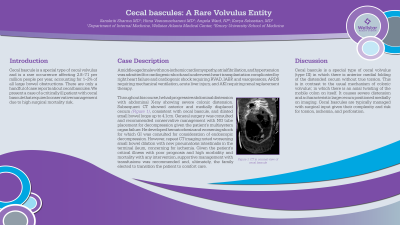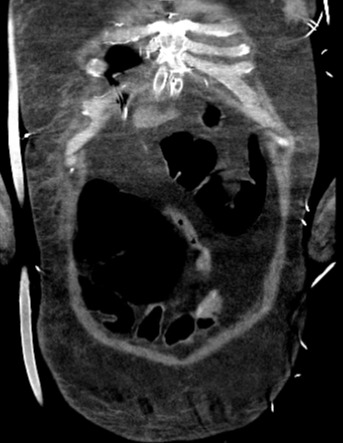Back


Poster Session A - Sunday Afternoon
Category: Colon
A0128 - Cecal Bascules: A Rare Volvulus Entity
Sunday, October 23, 2022
5:00 PM – 7:00 PM ET
Location: Crown Ballroom

Has Audio
- SS
Sanskriti Sharma, MD
WellStar Atlanta Medical Center
Atlanta, GA
Presenting Author(s)
Sanskriti Sharma, MD1, Hima Veeramachaneni, MD2, Kavya Sebastian, MD2, Angela Ward, ARNP2
1WellStar Atlanta Medical Center, Atlanta, GA; 2Emory University School of Medicine, Atlanta, GA
Introduction: Cecal bascule is a special type of cecal volvulus and is a rare occurrence affecting 2.8–7.1 per million people per year, accounting for 1–2% of all large bowel obstructions. There are only a handful of case reports about cecal bascules. We present a case of a critically ill patient with cecal bascule that required conservative management due to high surgical mortality risk.
Case Description/Methods: A middle-aged male with non-ischemic cardiomyopathy, atrial fibrillation, and hypertension was admitted for cardiogenic shock and underwent heart transplantation complicated by right heart failure and cardiogenic shock requiring right ventricular assist device, intra-aortic balloon pump, and vasopressors, acute respiratory distress syndrome requiring mechanical ventilation, acute liver injury, and acute kidney injury requiring renal replacement therapy.
Throughout his course, he had progressive abdominal distension with abdominal X-ray showing severe colonic distension. Subsequent CT showed anterior and medially displaced cecum (Image 1), consistent with cecal bascule, and dilated small bowel loops up to 4.1cm. General surgery was consulted and recommended conservative management with nasogastric tube for decompression given the patient’s multisystem organ failure. He developed hematochezia and worsening shock for which GI was consulted for consideration of endoscopic decompression. However, repeat CT imaging noted worsening small bowel dilation with new pneumatosis intestinalis in the terminal ileum, concerning for ischemia. Given the patient's critical illness with poor prognosis and high morbidity and mortality with any intervention, supportive management with transfusions was recommended and, ultimately, the family elected to transition the patient to comfort care.
Discussion: Cecal bascule is a special type of cecal volvulus (type III) in which there is anterior medial folding of the distended cecum without true torsion. This is in contrast to the usual mechanism of colonic volvulus’, in which there is an axial twisting of the mobile colon on itself. It causes severe distension and a characteristic large cecum positioned medially on imaging. Cecal bascules are typically managed with surgical input given their complexity and risk for torsion, ischemia, and perforation.

Disclosures:
Sanskriti Sharma, MD1, Hima Veeramachaneni, MD2, Kavya Sebastian, MD2, Angela Ward, ARNP2. A0128 - Cecal Bascules: A Rare Volvulus Entity, ACG 2022 Annual Scientific Meeting Abstracts. Charlotte, NC: American College of Gastroenterology.
1WellStar Atlanta Medical Center, Atlanta, GA; 2Emory University School of Medicine, Atlanta, GA
Introduction: Cecal bascule is a special type of cecal volvulus and is a rare occurrence affecting 2.8–7.1 per million people per year, accounting for 1–2% of all large bowel obstructions. There are only a handful of case reports about cecal bascules. We present a case of a critically ill patient with cecal bascule that required conservative management due to high surgical mortality risk.
Case Description/Methods: A middle-aged male with non-ischemic cardiomyopathy, atrial fibrillation, and hypertension was admitted for cardiogenic shock and underwent heart transplantation complicated by right heart failure and cardiogenic shock requiring right ventricular assist device, intra-aortic balloon pump, and vasopressors, acute respiratory distress syndrome requiring mechanical ventilation, acute liver injury, and acute kidney injury requiring renal replacement therapy.
Throughout his course, he had progressive abdominal distension with abdominal X-ray showing severe colonic distension. Subsequent CT showed anterior and medially displaced cecum (Image 1), consistent with cecal bascule, and dilated small bowel loops up to 4.1cm. General surgery was consulted and recommended conservative management with nasogastric tube for decompression given the patient’s multisystem organ failure. He developed hematochezia and worsening shock for which GI was consulted for consideration of endoscopic decompression. However, repeat CT imaging noted worsening small bowel dilation with new pneumatosis intestinalis in the terminal ileum, concerning for ischemia. Given the patient's critical illness with poor prognosis and high morbidity and mortality with any intervention, supportive management with transfusions was recommended and, ultimately, the family elected to transition the patient to comfort care.
Discussion: Cecal bascule is a special type of cecal volvulus (type III) in which there is anterior medial folding of the distended cecum without true torsion. This is in contrast to the usual mechanism of colonic volvulus’, in which there is an axial twisting of the mobile colon on itself. It causes severe distension and a characteristic large cecum positioned medially on imaging. Cecal bascules are typically managed with surgical input given their complexity and risk for torsion, ischemia, and perforation.

Figure: CT in coronal view of cecal bascule
Disclosures:
Sanskriti Sharma indicated no relevant financial relationships.
Hima Veeramachaneni indicated no relevant financial relationships.
Kavya Sebastian indicated no relevant financial relationships.
Angela Ward indicated no relevant financial relationships.
Sanskriti Sharma, MD1, Hima Veeramachaneni, MD2, Kavya Sebastian, MD2, Angela Ward, ARNP2. A0128 - Cecal Bascules: A Rare Volvulus Entity, ACG 2022 Annual Scientific Meeting Abstracts. Charlotte, NC: American College of Gastroenterology.
